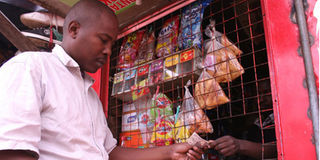To tax or not to tax milk and bread?

Mr Nicholas Ngure buys milk and bread from a kiosk in Ngara, Nairobi. The August 9 General Election, new taxes, cost of energy, inflation and the Covid-19 pandemic are expected to drive commodity prices this year.
What you need to know:
- Law that was first introduced last year is likely to ignite debate on taxing basic goods like flour and sanitary towels
- Treasury is seeking to introduce tax but consumer lobby group objects
Debate over a proposed law that could impose taxes on basic commodities is likely to be re-ignited when the Treasury presents the 2013/2014 Budget to Parliament on Thursday.
Earlier this week, the National Treasury Cabinet Secretary, Mr Henry Rotich, renewed the push for Parliament to pass the Value-Added Tax (VAT) Bill.
The law proposes to impose a 16 per cent tax on bread, milk, sanitary towels and wheat flour and it is at the heart of the Treasury’s bid to fund the Sh1.65 trillion 2013/2014 national Budget.
The proposed law was first introduced in Parliament last year as a part of a raft of taxation reforms contained in the then Finance minister Njeru Githae’s 2012/2013 Budget speech.
However, it came to a grinding halt amid opposition from the public, parliamentarians and the private sector. Parliament put the controversial law on hold as it passed time-bound constitutional legislation.
The VAT Bill was born of a need to streamline and simplify the legislative regime as well as to seal various leaks in tax collection.
VAT currently contributes about 29 per cent of total revenue collection. However, the Treasury estimates that this could rise to 40 per cent with legislation that encourages compliance.
“The main objective was to make the VAT tax code simple so that the government does not spend more money on the administration of the tax relative to the amount that it collects,” said Mr John Mutua, a budgeting expert at the Institute of Economic Affairs.
The Treasury proposed a leaner list of tax exemptions and zero-rated goods. Goods that had been zero-rated, such as sanitary towels, newspapers, rice, wheat flour and processed milk would be subject to 16 per cent tax. Similar measures would apply to previously zero-rated services such as water drilling and film production.
Critics of the proposed VAT Bill have argued that the Treasury ought to pursue alternative measures of meeting revenue targets without increasing the tax burden on Kenyans.
The Consumer Federation of Kenya has called for adoption of austerity measures, pointing to “excessive costs on foreign travels”. It also wants KRA to increase transparency and efficiency in its revenue collection processes.




